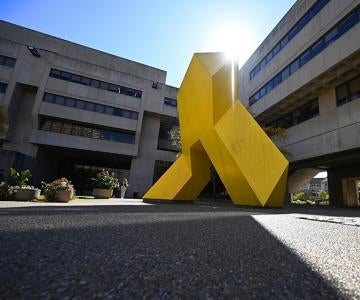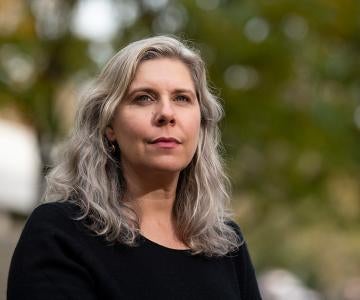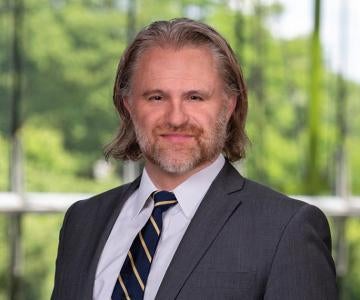
Subscribe to Pittwire Today
Get the most interesting and important stories from the University of Pittsburgh.During a May 16 virtual address to thousands of members of the Association of American Universities (AAU), an organization of research institutions that includes Pitt, President Volodymyr Zelenskyy argued that the path to a better, stronger Ukraine is to rebuild its higher education system through partnerships with world-class research universities.
“I’m very grateful to your nation, to your leaders,” he said. “At the end of the day, this is the answer to our question: Who do you want to be, what do you want to be? If you don’t want to be a victim or an indifferent bystander, you should instead be fighters for democracy, guardians of democracy.”
“For the people who experience and survive this terrible war, they will be yearning for knowledge and skills,” Zelenskyy said.
In March 2022, a month after Russia breached the country’s eastern border, Ukraine’s government, educational institutions and civil society organizations jointly launched the Ukrainian Global University, a network connecting displaced college students, scientists and scholars to international education opportunities. Pitt is one of several American universities to join the international coalition and is sponsoring three students to enroll in the School of Law this fall through the recently established Ukrainian Legal Assistance Project.
“The concept of Ukrainian Global University proposes a globally coordinated response to the urgent need for protecting and investing in the human capital necessary to rebuild the country,” said Ariel Armony, Pitt’s vice provost for global affairs and director of the University Center for International Studies. “A Ukraine-led initiative, Ukrainian Global University could serve as a model for other nations and for higher education institutions around the world.”

Universities not only educate a nation's populace, but they also contribute to the entrepreneurial spirit, health care, economic growth and cultural vibrancy essential for a country to thrive. Though Russia’s invasion of Ukraine is ongoing, Zelenskyy described Ukraine’s educators as hungry to get back to normal.
“Everyone is sick of this idleness,” he said, “Life at our educational institutions is re-galvanized.”
“People want to continue with their lives, and work is an essential part of life, especially if you’re an intellectual, researcher or educator. They want to see their students — they want to see the future, even if only virtually on a cellphone or computer,” he added.
During a question and answer session, Pitt’s Chancellor Patrick Gallagher, who is the current president of AAU’s board asked, “What is the status of the Ukrainian university student population now? And how are they doing? Are there ways in which students from around the world can support them during this time of difficulty?”
Zelenskyy replied that students are continuing their courses online, though many have joined the resistance since the Feb. 24 invasion. “Life must go on, regardless of the fact that in some occupied communities death is raining. Life in our country must go on, shall go on. The students will study and the young are getting ready for lectures exams and tests.”
Since the beginning of the war, Pitt has stood in solidarity with the Ukrainian people and condemned Russia’s invasion of the independent and democratic nation. The University also has a history of long-standing research and academic relationships with colleagues and students from and within Ukraine, including fundraising efforts led by Tymofiy Mylovanov, an associate professor of economics in the Kenneth P. Dietrich School of Arts and Sciences and president of the Kyiv School of Economics. He has helped raise more than $800,000 to support humanitarian efforts.
If you’d like to show your support, PittServes has also compiled a list of resources and ways to donate to Ukraine.
— Nichole Faina





